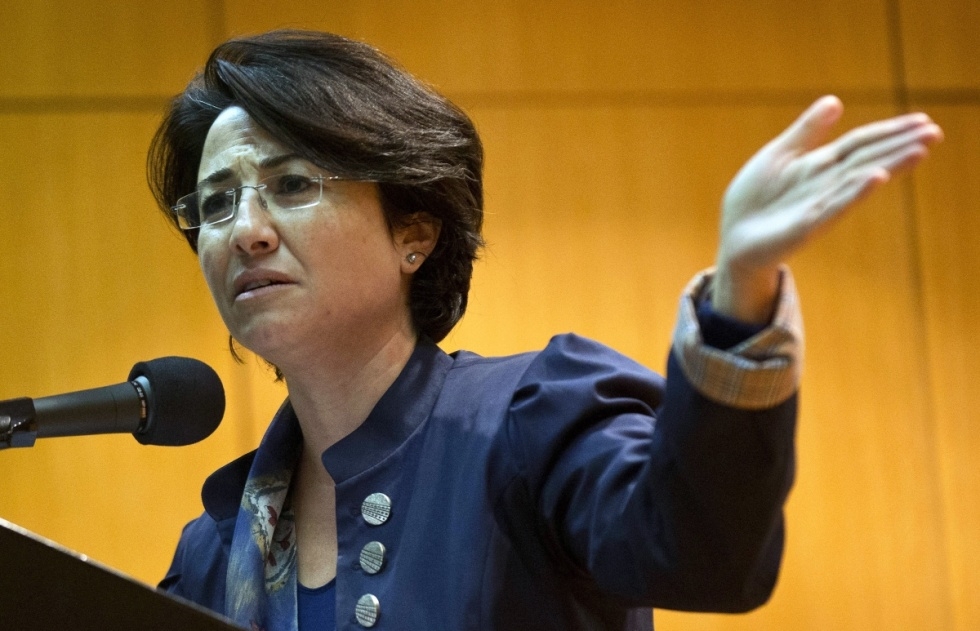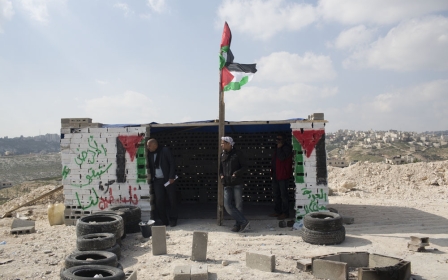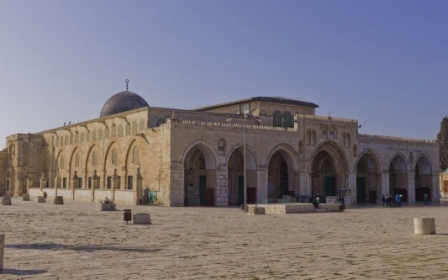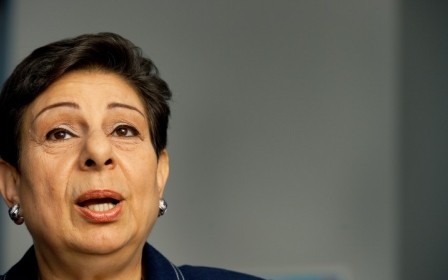Palestinian legislator barred from standing in Israeli election

NAZARETH, Israel - Israel’s Central Elections Committee (CEC) on Thursday barred Haneen Zoabi, one of the most prominent Arab politicians in Israel, from running for the Israeli parliament in next month’s general election.
The decision was backed by all of the main political parties, which dominate the committee.
Foreign minister Avigdor Lieberman’s, Yisrael Beiteinu, party had submitted a 50-page dossier of quotes it claimed proved Zoabi supported armed struggle by Israel’s enemies and opposed Israel’s character as a Jewish and democratic state.
Zoabi, a member of Israel’s parliament, known as the Knesset, is running for a recently announced coalition of Arab parties, called the Joint List. It is the first time that all the Arab parties in the Knesset have decided to join forces and run together.
A petition demanding her disqualification was also submitted by the ruling Likud party of Prime Minister Benjamin Netanyahu.
The Zionist Camp, the second biggest faction after Netanyahu’s, which has positioned itself as centre-left, also supported the ban – a decision that sealed Zoabi’s fate before the committee.
Zoabi accused the committee of “political persecution”.
She told Middle East Eye: “The Jewish parties are constructing a false image of me, one designed to incite against me and the public I represent. It says we have no place in the Knesset or even the public discourse. It fuels the racist atmosphere here.”
Zoabi was heckled when she tried to speak with calls of: “You have the blood of our soldiers on your hands”.
In her response to the committee, she said: “Why are those calling for death and destruction, land appropriation, and the death of the people of Gaza not standing here? Those attempting to get me banned, they are the ones who should be here.”
All of the main parties ignored the advice of Yehuda Weinstein, the Attorney General who on Wednesday night said that there were no legal grounds for disqualifying Zoabi.
Appeal to courts
Disqualification by the CEC is familiar territory for Zoabi. The committee barred her from running in the previous election, two years ago, although the decision was overturned following an appeal to the Israeli Supreme Court.
Zoabi is one of 11 legislators in parties representing Israel’s minority of some 1.5 million Palestinian citizens, Palestinians who remained on their lands after 1948 and today comprise a fifth of Israel’s population. There are 120 seats in the Knesset.
The right has been making expulsion of Zoabi from the Knesset – and Israel – a central campaign issue, suggesting that she and the other Arab MKs are foreign agents. One of Yisrael Beiteinu’s campaign slogans is “Haneen to Jenin” – a reference to a Palestinian city in the occupied West Bank, a short drive from her home town of Nazareth.
The Joint List immediately announced it would appeal against Zoabi’s disqualification to the Supreme Court. A hearing is likely next week.
Adalah, a legal group for the Arab minority in Israel that represents Zoabi, said it hoped the judges would overturn the CEC’s decision, as they did in 2013.
The evidence to support the disqualification, Adalah said in a statement, was “frivolous and part of a racist discourse against the Arab Palestinian representatives in the Knesset.”
Although legal experts have noted that there is no basis in law for the disqualification, Zoabi said there was a danger the judges would be swayed by the current political climate. “We will see whether they can withstand the pressure,” she said.
In a move that surprised many observers in December, the court refused to overturn a decision by the Knesset to suspend Zoabi for a record six months from her parliamentary duties. MKs had objected to statements she made last summer during and in the build-up to Israel’s attack on Gaza, Operation Protective Edge.
The court only just published its reasoning this Wednesday, with one judge, Miriam Naor - who was recently appointed the court’s president - saying that Zoabi “went too far” in her statements, included calling for a diplomatic “siege” on Israel.
Bill to expel Zoabi
Should the court overrule the election committee, the right wing have threatened to reverse the decision with legislation whose progress was halted by the dissolution of the Knesset.
The so-called “Zoabi Bill”, which has Netanyahu’s backing, would allow a majority of legislators to vote to expel any MK they believe has voiced support for a terrorist organisation.
The bill’s drafter, Danny Danon of Likud, has said the goal of the legislation is “to make sure that she [Zoabi] would not be able to come back to [the] Knesset”.
Zoabi was catapulted to the status of public enemy number one back in 2010 when she took part in the Mavi Marmara flotilla taking aid to Gaza. The Israeli navy intercepted the ship in international waters in an operation that killed nine, including eight Turkish activists. Her participation on the ship provided the basis for the election committee’s decision to disqualify her in 2013.
But opposition to her presence in the Knesset has grown rapidly since last summer.
The election committee based its decision on the same statements that led to her suspension from the Knesset last July, in the midst of Operation Protective Edge.
They included a radio interview a month earlier in which she refused to label the Palestinians behind the kidnapping and killing of three Israeli teenagers from settler communities in the West Bank as “terrorists”. Most of the Israeli media edited out her criticism of the kidnapping.
During the 50-day Gaza war this summer, the 45-year-old also called for what Israeli media reported as a “siege” on Israel. While Zoabi and linguists subsequently clarified that the word she used is in Arabic is understood to refer to diplomatic isolation, not a military siege, the Supreme Court and right wing parties have insisted that she was calling for a military assault on Israel.
Zoabi is also facing a trial for insulting two Arab policeman outside a court hearing, allegedly calling them “traitors”.
Boycott calls grow louder
Zoabi’s disqualification comes as the four Arab parties in the Knesset have been struggling to revive their fortunes. In recent elections, they have found themselves coming under ever-greater attack from both outside and inside their community.
Israeli politicians on the right now habitually describe the Arab MKs as “terrorists” and “traitors” and question their right to be in the Knesset, or even remain as Israeli citizens.
Meanwhile, voices have been growing louder inside the Palestinian minority for a boycott of Knesset elections. At the last two ballots, in 2009 and 2013, barely more than half the Arab electorate turned out to vote – a massive fall in the voting rate seen in the 1990s.
Mohammed Zeidan, director of the Nazareth-based Human Rights Association, said a growing number of Palestinian citizens appeared to have concluded that, as the political climate shifts further to the right, the Knesset “is not a venue in which the minority can advance its rights”.
The four main Arab parties hit crisis last year when the Knesset passed a law that raised the electoral threshold for entry to the Knesset from 2 per cent to 3.25 percent. The figure was widely assumed to have been chosen because it ensured that none of the four parties would be likely to win enough votes.
Following the announcement of early elections late last year, the Arab parties engaged in lengthy negotiations to create a common list. Reports suggested that the talks were hampered by personality clashes and long-standing ideological differences. The parties represent socialist, nationalist and those with a more Islamist outlooks.
However, it was announced last month that the parties had agreed to a single electoral coalition.
“It is the first time the parties have cooperated,” said Zeidan, whose organisation published a report this week, Pushed Out of the Margins, on the impact of the election campaign on the Arab parties.
Test for Joint List
If Zoabi’s disqualification is confirmed by the court next week, it will be an early test for the Joint List. Will the other Arab parties take action to support her, or even refuse to run if she is barred?
In a sign of the inherent divisions in the coalition, it has so far has avoided saying what action it will take should the court uphold the ban. However, Jamal Zahalka, leader of Zoabi’s Balad party, said there would be “a response”.
But there are also possible advantages to unification.The Joint List has cited polls suggesting that the agreement will spur an upturn in voting and raise its total tally of seats to as many as 15, making the party the third or fourth largest in the Knesset.
In a sign of how the list is already changing electoral calculations, Sheikh Raed Salah, the influential leader of the northern Islamic Movement, which does not participate in Knesset elections, has reportedly lifted his objections to his followers voting.
The centrist Zionist Camp would also need the support of the Joint List to stand any hope of defeating Netanyahu and forming the next government. For now, both seem to believe that such an agreement is desirable although neither side has said so explicitly.
Ian Lustick, an expert on Israeli politics at the University of Pennsylvania, observed on his blog that the Zionist Camp’s initial support for Zoabi’s disqualification indicated that it was more interested in not straying too far from the rightwing consensus than in courting the Arab list.
It had, he wrote, set its “sights on a ‘national unity government’ featuring a rotation in leadership between current Prime Minister Benjamin Netanyahu and [Zionist Camp leader Isaac] Herzog.”
In private, Joint List officials say that, even if the Zionist camp was to seek their backing, there would be no way that Palestinian MKs could collude with the party given that it prioritises a Zionist agenda.
The Joint List has been accused of being slow to publicise its programme or to start holding joint rallies and launching a billboard campaign. It is due to launch its campaign this weekend in Nazareth under the slogan: “The will of the people”.
Its Hebrew-language campaign was initiated in Tel Aviv on Wednesday night under a different slogan: “My answer to racism.”
Ayman Odeh, head of the list, said the group would focus on advancing equality, social justice and national rights for Palestinian citizens. “We are entitled to civil and national equality,” he said. “For decades we have been fighting for both.”
New MEE newsletter: Jerusalem Dispatch
Sign up to get the latest insights and analysis on Israel-Palestine, alongside Turkey Unpacked and other MEE newsletters
Middle East Eye delivers independent and unrivalled coverage and analysis of the Middle East, North Africa and beyond. To learn more about republishing this content and the associated fees, please fill out this form. More about MEE can be found here.




